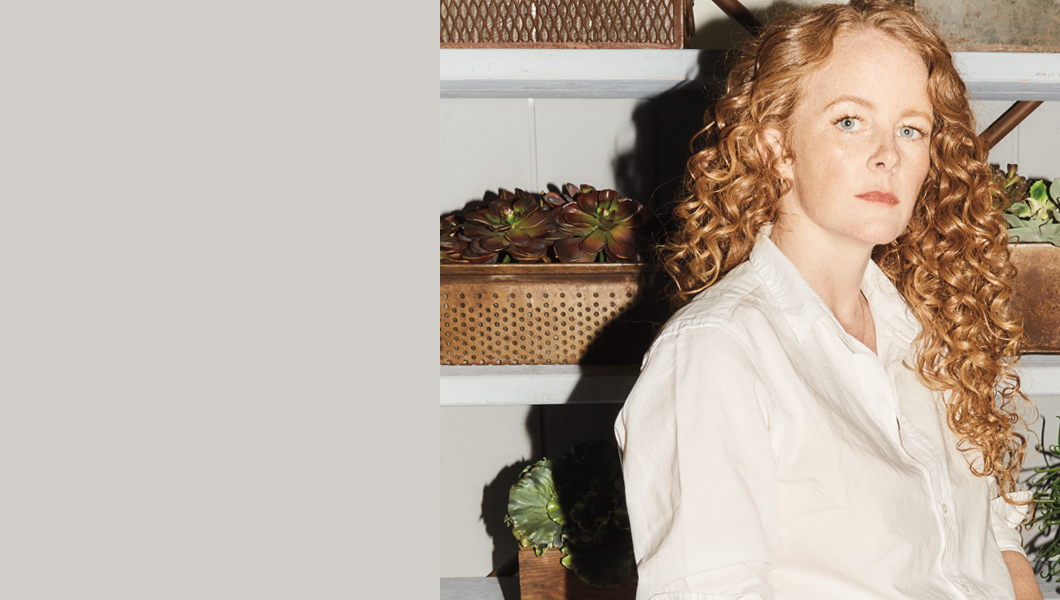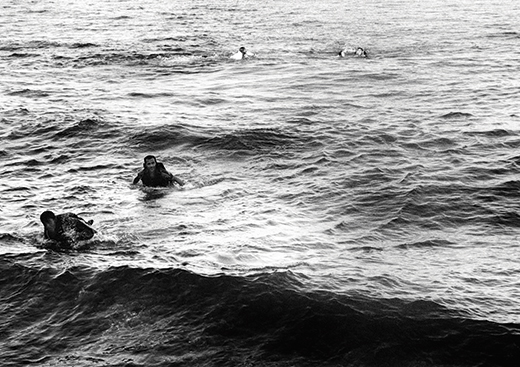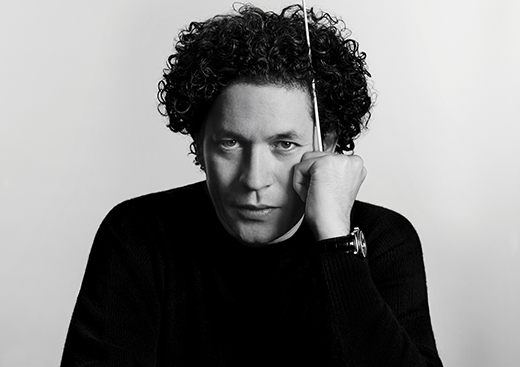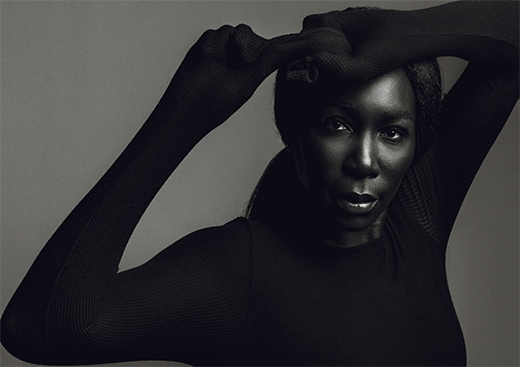“I’ve just been working ever since I moved here,” says Audrey McLoghlin, reflecting on her past 15 years in Los Angeles. She sits on a couch in the showroom of Frank & Eileen, the company she founded eight years ago and named after her beloved, long-married Irish grandparents. “So this beautiful showroom is my community,” she continues. The carefully curated space, located on the top floor of the century-old Lady Liberty Building on Los Angeles Street downtown, looks intentionally quaint, like it was imported to Los Angeles from somewhere quieter. There are traces of the American south, where McLoghlin spent most of her youth, and of countryside in Ireland, where her grandparents, aunts, uncles and cousins lived. Walls of antique windows and gray wood paneling separate rooms. Cake and favors are leftover from a birthday party for a staff member. Plants fill tall wooden shelves. Long wooden tables stretch across the central hallway, and in a dining nook hangs a wall work the size of a museum-ready painting, made of Frank & Eileen fabrics but slightly reminiscent of German artist Cosima von Bonin’s patchwork compositions.
When she arrived in Los Angeles, McLoghlin knew little about fashion. She certainly didn’t know she would design a line of shirting that merged luxurious Italian fabrics with a casual California aesthetic and an Irish love story.
A graduate of Georgia Tech’s engineering program, she had worked at a tech start-up in Cambridge, Massachusetts, during the Dot Com boom. “I was one of the only female software engineers,” she recalls. “It was a wild time.” Then the bubble burst, the tech industry crashed, and she decided to move to California to learn about manufacturing.
“I knew I wanted to build something,” she remembers. “At that point, I just had no idea what that meant.” Within weeks, she was working with an accessories designer, learning the design business. Within a year, she had opened a high-end boutique in Manhattan Beach named Una, after her mother. Within four years, she founded Aude, a multi-brand wholesale company that would keep her Una stores fully stocked. Frank & Eileen came to her by accident. She had gone to visit a manufacturer to discuss a tissue-weight cashmere concept. “He put me into a room and said, ‘Wait here for a minute,’” she remembers. “He left me in there too long and I started snooping, which is my favorite thing to do when I’m left alone.” She found an old book of Italian menswear fabrics, made by a family-owned mill in Bergamo, Italy. By the time the manufacturer returned, she had lost all interest in cashmere. By the end of 2008, she was making men’s and women’s shirts with the 140-year-old Italian mill.
Now, she travels at least twice yearly to Bergamo and finds inspiration in the mill’s archives. She also travels routinely to Japan, which became one of Frank & Eileen’s largest markets within a year of the company’s launch, much to McLoghlin’s surprise. She’d done no targeted marketing, only sold shirts out of Ron Herman’s Tokyo store. “Audrey, you’re famous in Japan,” Ron Herman called to say when he went over for the opening of his second store. “You have to get over here.” She describes a funny afternoon in Tokyo, going store to store. None of the stores had her shirts. Finally, exasperated, she asked through a translator what they were doing. Apparently, most of the city was sold out of Frank & Eileen. “I asked, ‘Why is Frank & Eileen so popular?’” says McLoghlin, who talks about her success as if it’s something she luckily stumbled upon. “Basically, he said, there’s nothing else like this on the market […]. The Japanese love the juxtaposition.” They liked the elegant Italian tailoring combined with the cool California lifestyle. McLoghlin never exactly planned this combination.
“It just soaks into your skin,” she observes of California coolness. When she arrived in L.A. from the more sartorially conservative East Coast, she moved to Venice Beach and hasn’t left. She spends the little time she has away from her showroom there. “There’s a whole different sensibility of how you dress, what you wear to go to brunch. If you go to brunch in Charlotte, you probably wear a St. John’s suit. In L.A., you wear this gorgeous, expensive Italian shirt but it’s all wrinkled.” She people-watches in her Venice neighborhood for inspiration. “On weekends even, your brain never really even relaxes,” she says. “You see someone on the street and you have an idea. Maybe it’s a color or something else.”
If she has a chance to read and research, however, she delves not into fashion but into the business side of things. “I exclusively read entrepreneur biographies. I’m obsessed,” she says. Favorite subjects include Apple’s Steve Jobs and Howard Schultz of Starbucks, and she just finished the autobiography of designer Donna Karan, whom she’d previously considered an untouchable ’80s icon. “I can’t believe how honest and how raw she was,” McLoghlin muses of Karan. “It’s really humbling to be able to read other people’s stories and realize how painful the process was for them. I mean, they might have loved it, but there’s a lot of blood, sweat and tears.”
She recalls the amount of time she spends navigating tax law, labor laws and accounting issues. “The fashion part is 5-10% of it. You have to be starting a business because you love business,” she says. “I love it.”
—





